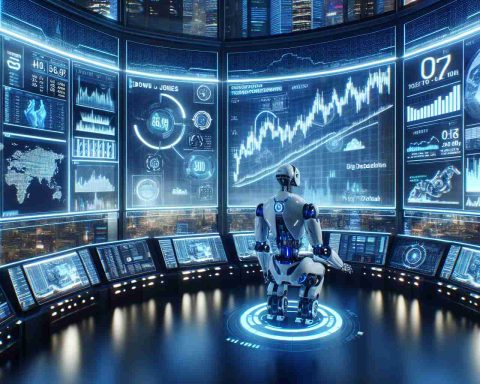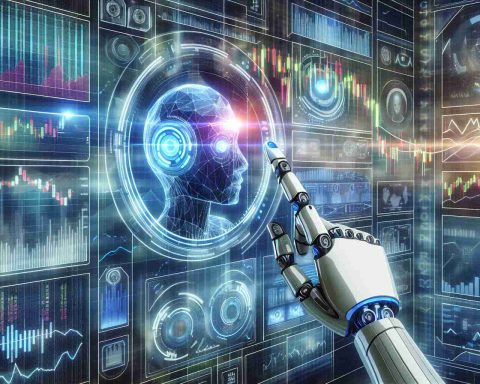The landscape of the stock market is undergoing a seismic shift, driven by the integration of advanced technologies like artificial intelligence (AI). Today’s traders are not just competing with one another; they’re also contending with AI-driven algorithms that are transforming how transactions are conducted and decisions are made. This evolution is not just a technical enhancement; it’s a fundamental shift in market dynamics.
AI technologies, particularly machine learning, are revolutionizing how financial data is analyzed. Gone are the days when traders relied solely on human intuition and historical data. Now, AI systems can process vast amounts of data at unprecedented speeds, identifying patterns and trends that might elude even the most seasoned market experts. This capability allows for more informed and timely investment decisions, enhancing efficiency and potentially increasing returns.
However, the rise of AI in the stock market introduces new challenges and considerations. Ethical concerns about algorithmic fairness and market manipulation are at the forefront of regulatory discussions. As AI systems become more autonomous, ensuring they operate transparently and equitably remains a critical issue.
Looking towards the future, the integration of AI in the stock market presents both opportunities and threats. As technological capabilities expand, traders must adapt to this new normal, leveraging AI to gain a competitive edge while remaining vigilant about the ethical implications. The stock market of tomorrow will demand innovation, strategic thinking, and a keen understanding of both digital and human elements.
The Future of Finance: AI’s Expanding Influence on the Stock Market and Beyond
The rise of artificial intelligence (AI) in the stock market is changing the very foundations of financial trading, influencing not just economic landscapes but also touching on broader societal and environmental aspects that pose both challenges and opportunities for humanity’s future. Among these, the economic dimension is particularly pronounced as AI algorithms transform market dynamics, efficiency, and transparency.
Economic Impact and Future Implications
The integration of AI in stock trading significantly enhances the decision-making process by enabling the rapid analysis of massive datasets, which identifies trends and patterns more accurately than traditional human-centered approaches. This not only boosts market efficiency but also pushes firms and individual traders towards adopting AI technologies to remain competitive. Over time, this may lead to an economic environment where human traders must upscale their skills, potentially narrowing job opportunities unless there is a broader initiative for upskilling in AI and data comprehension.
The heightened speed and accuracy offered by AI can lead to improved liquidity and more stabilized markets, which in theory, should benefit investors and the economy as a whole. By minimizing human error and emotional decision-making, AI-driven trading could potentially reduce instances of market volatility. However, the concentration of advanced AI technologies in the hands of a few might lead to increased inequality within the financial sector, where those without access to such technologies could be at a distinct disadvantage.
Yet, there’s an ethical conundrum that surfaces with AI’s autonomous functioning—market manipulation and algorithmic bias—which are critical issues that need continuous monitoring. If unchecked, these could undermine trust in financial systems, necessitating robust regulatory frameworks to ensure fairness and transparency. The future of finance will indeed require balancing technological advancements with ethical safeguards to maintain integrity within the market.
Connecting to the Future of Humanity
The broader influence of AI in finance could mirror its application in other sectors, suggesting a future where automation and machine learning redefine numerous aspects of daily life. The challenge lies in managing this transformation to ensure it complements human skills rather than replaces them, ideally leading to enhanced job roles and the creation of new sectors focused on AI oversight and maintenance.
In conclusion, the use of AI in financial markets is a microcosm of its potential impact on society and the environment. While it promises greater efficiency and possibly more equitable market conditions, it also calls for a reevaluation of ethical standards and the need for adaptive human capacities. As the landscape evolves, humanity faces an exciting opportunity to harness these technological advancements for a more innovative and inclusive economic future.
How AI is Shaping the Future of Stock Market Trading: Key Insights and Challenges
The stock market is evolving rapidly, with artificial intelligence (AI) playing a pivotal role in redefining trading paradigms. As AI-driven algorithms increasingly dominate this sector, understanding their impact becomes crucial for traders and investors alike. Here, we delve into new and essential insights about the intersection of AI and stock market trading, focusing on trends, advantages, challenges, and future predictions.
AI-Driven Trading: Pros and Cons
Pros:
1. Enhanced Decision-Making: AI offers the ability to process and analyze financial data swiftly, uncovering hidden patterns and predicting market trends more accurately than traditional methods.
2. Increased Efficiency: Automation of routine tasks reduces human error and increases trade execution speeds, allowing investors to capitalize on fleeting market opportunities.
Cons:
1. Ethical Concerns: There’s an ongoing debate about algorithmic fairness and the potential for AI to introduce biases, leading to market manipulation.
2. Regulatory Challenges: As AI systems become more autonomous, creating frameworks that ensure transparency and accountability remains a formidable task.
Security Aspects and Regulatory Measures
Ensuring the security and ethical use of AI in financial markets is paramount. Regulatory bodies are increasingly focusing on developing guidelines to promote ethical AI use, prevent data misuse, and manage the complexities introduced by these sophisticated systems. Discussions also emphasize the need for comprehensive audits and real-time monitoring of AI algorithms to avert potential crises.
Market Trends and Future Predictions
The integration of AI into stock trading is not just a current trend but a long-term transformation. Here are some predictions and insights into its future impacts:
– Personalized Trading Strategies: As AI evolves, we might see the development of highly personalized investment strategies tailored to individual risk profiles and financial goals.
– Collaboration Over Competition: The future might see AI and human traders working collaboratively, combining machine speed and precision with human intuition and experience.
Innovations in AI Stock Trading
Emerging technologies like quantum computing could further revolutionize AI capabilities in finance. These advancements promise to exponentially increase computational power, enabling even more nuanced analysis of complex market data.
Conclusion: Embracing the Change
In conclusion, the integration of AI in the stock market is both a challenge and an opportunity. Embracing this change involves not only leveraging technological advancements for improved trading performance but also addressing the ethical and regulatory issues that accompany such a seismic shift. Traders who adapt will be better positioned to thrive in this dynamic environment.
For more insights on market trends and tools, visit Investopedia for comprehensive resources and analysis.















